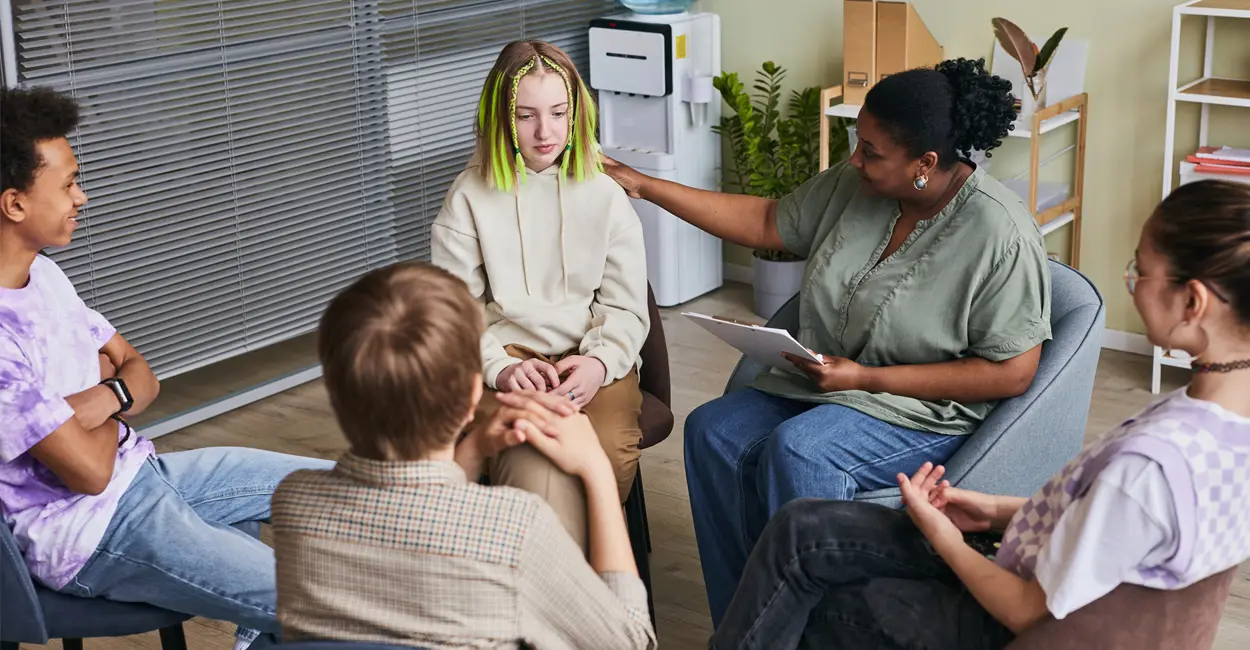24/7 Helpline:
(866) 899-111424/7 Helpline:
(866) 899-1114
Learn more about Group Therapy centers in Oregon
Group Therapy in Other Cities

Other Insurance Options

Sliding scale payment assistance

CareSource

CareFirst

Multiplan

Magellan Health

Carleon

American Behavioral

Horizon Healthcare Service

Ceridian

State Farm

GEHA

Access to Recovery (ATR) Voucher

Highmark

Providence

Private insurance

Magellan

Health Net

United Health Care

Ambetter
Beacon

Tillamook Family Counseling Center
Tillamook Family Counseling Center is a private counseling clinic located in Tillamook, OR. Tillamoo...

Hooper Detoxification Stabilization Center
Hooper Detoxification Stabilization Center is a drug and alcohol rehab in Portland, Oregon. They pro...

Awakenings by the Sea
Awakenings by the Sea offers inpatient and outpatient services for women with substance addiction an...

Recovery Works NW
Recovery Works NW is a private rehab located in Tigard, Oregon. Recovery Works NW specializes in the...

Recovery Blvd Treatment Center
BLVD Treatment Centers offers outpatient treatment for individuals with alcohol and/or substance add...

Serenity Lane – Coburg Industrial Way
Serenity Lane is an accredited drug and alcohol addiction treatment center in Eugene, Oregon for adu...

Central City Concern Recovery
Central City Concern Recovery is a non-profit rehab located in Portland, Oregon. Central City Concer...

Lutheran Community Services – Cesar E Chavez Boulevard
Lutheran Community Services – Cesar E Chavez Boulevard is a private rehab located in Portland, Orego...

Milestones Family Recovery Program – Women’s Residential
Milestones Family Recovery Program – Women’s Residential is a private rehab located in Corvallis, Or...

Another Chance Drug & Alcohol Rehab Center of Portland
Another Chance Drug & Alcohol Rehab Center of Portland is a private rehab located in Portland, Orego...

New Season – Portland Metro Treatment Center
New Season – Portland Metro Treatment Center is a drug and alcohol rehab located in Portland, OR. Th...

Volunteers of America of Oregon – Men’s Residential
Volunteers of America of Oregon - Men's Residential is a non-profit rehab located in Portland, OR. V...

Salem Hospital – Psychiatric Medicine Center
Salem Hospital – Psychiatric Medicine Center is a private rehab located in Salem, Oregon. Salem Hosp...

Youth Contact – Baseline Street
Youth Contact – Baseline Street is a private rehab located in Hillsboro, Oregon. Youth Contact – Bas...

Emergence Addictions and Behavioral Therapies
Emergence Addictions and Behavioral Therapies offers free substance abuse treatment to individuals t...

Serenity Lane
Serenity Lane is located in Albany, Oregon. Serenity Lane is a specialty treatment facility for the ...

InAct Treatment and Prevention Services
InAct Treatment and Prevention Services is a private rehab located in Portland, Oregon. InAct Treatm...

TM Counseling and Consulting
TM Counseling and Consulting is a private rehab located in Pendleton, Oregon. TM Counseling and Cons...

Serenity Lane
Serenity Lane is located in Eugene, Oregon. Serenity Lane is a specialty treatment facility for the ...

ADAPT
Adapt is a private alcohol and drug addiction treatment center in Roseburg, Oregon. They provide inp...

De Paul Treatment Centers – Adult Center
Formerly De Paul Treatment Centers, Fora Health is a dual diagnosis, drug, and alcohol treatment cen...

Amazing Treatment
Amazing Treatment is a private rehab located in Salem, Oregon. Amazing Treatment specializes in the ...

CODA – Gresham Recovery Center
CODA–Gresham Recovery Center is an inpatient drug and alcohol rehab for adults in Portland, Oregon. ...

Safe Journeys
Safe Journeys is a private rehab located in Tualatin, Oregon. Safe Journeys specializes in the treat...

Sequoia Mental Health Services
Sequoia Mental Health Services is a behavioral health rehab facility in Beaverton, OR for men and wo...

Yamhill County – Family and Youth Programs
Yamhill County – Family and Youth Programs is a public rehab located in Mcminnville, Oregon. Yamhill...

Hazelden Betty Ford
Hazel Betty Ford Foundation's drug and alcohol rehab programs for men and women combine evidence-bas...

Centro Latino Americano
Centro Latino Americano is a private rehab located in Eugene, Oregon. Centro Latino Americano specia...

Ontrack Rogue Valley
Ontrack Rogue Valley is a non-profit rehab located in Medford, Oregon. Ontrack Rogue Valley speciali...

Emergence – Oak street
Emergence – Oak street is a private rehab located in Eugene, Oregon. Emergence – Oak street speciali...

CODA – Greenburg Road
CODA – Greenburg Road is a private rehab located in Portland, Oregon. CODA – Greenburg Road speciali...

Looking Glass Community Services – 260 East 11th Avenue
Looking Glass Community Services – 260 East 11th Avenue is a private rehab located in Eugene, Oregon...

Choices Counseling Center
Choices Counseling Center is a private rehab located in Grants Pass, Oregon. Choices Counseling Cent...

Integrated Health Clinics
Integrated Health Clinics offers outpatient services for individuals with alcohol and/or substance a...

Willamette Family – Green Acres Cariton Services
Willamette Family – Green Acres Cariton Services is a non-profit rehab located in Eugene, Oregon. Wi...

Lifeworks
Lifeworks is a private rehab located in Portland, Oregon. Lifeworks specializes in the treatment of ...

Klamath Tribal Health & Family Services
Klamath Tribal Health & Family Services is a public rehab located in Klamath Falls, Oregon. Klamath ...

South Lane Mental Health Services
South Lane Mental Health Services (SLMH) is a non-profit community mental health organization locate...

Emergence
Emergence is a non-profit rehab located in Eugene, Oregon. Emergence specializes in the treatment of...

Osoa Therapy
Osoa Therapy is a private rehab located in Pendleton, Oregon. Osoa Therapy specializes in the treatm...

Columbia Community Mental Health – Creekside Center
Columbia Community Mental Health – Creekside Center is a drug and alcohol rehab located in Saint Hel...

Teras Intervention and Counseling
Teras Intervention and Counseling is a non-profit rehab located in Portland, Oregon. Teras Intervent...

Cameron Care
Cameron Care is a private rehab located in Portland, Oregon. Cameron Care specializes in the treatme...

Providence Hood River Memorial Hospital Behavioral Health
Providence Hood River Memorial Hospital Behavioral Health is a private rehab located in Hood River, ...

Hilltop Behavioral Health Center Behavioral Health
Hilltop Behavioral Health Center Behavioral Health is a public rehab located in Oregon City, OR. Hil...

Willamette Family
Willamette Family Treatment Services - Rapid Access Center (RAC) and Health Clinic is a non-profit r...

Addictions and Family Counseling
Addictions and Family Counseling is a private counseling clinic located in Troutdale, OR. Addictions...

Center for Human Development
Center for Human Development is a private rehab located in La Grande, Oregon. Center for Human Devel...

Emergence Addictions and Behavioral Therapies
Emergence Addictions and Behavioral Therapies is a non-profit rehab located in Springfield, Oregon. ...

Lake District Wellness Center
Lake District Wellness Center is a public rehab located in Lakeview, Oregon. Lake District Wellness ...

Ontrack – Home
Ontrack – Home is a private rehab located in Medford, Oregon. Ontrack – Home specializes in the trea...

Integrated Health Solutions and Anger Management
Integrated Health Solutions and Anger Management is a private rehab located in Portland, Oregon. Int...

Teen Challenge – Seattle Metro Campus
Teen Challenge - Seattle Metro Campus offers inpatient treatment for men with alcohol and/or substan...

Rimrock Trails Adolescent Treatment Services
Rimrock Trails Adolescent Treatment Services is a non-profit rehab located in Prineville, OR. Rimroc...

Pacific Alcohol and Drug Counseling
Pacific Alcohol and Drug Counseling is a private rehab located in Portland, Oregon. Pacific Alcohol ...

Lutheran Community Services – Klamath Basin Office
Lutheran Community Services – Klamath Basin Office is a private rehab located in Klamath Falls, Oreg...

Outside In
Outside In is a private rehab located in Portland, Oregon. Outside In specializes in the treatment o...

Integrated Health Clinics
Integrated Health Clinics is a drug and alcohol rehab located in Eugene, Oregon. They provide outpat...

Peace Health Behavioral Health Service
Peace Health Behavioral Health Service is a private rehab located in Eugene, Oregon. Peace Health Be...

CODA – Hillsboro Recovery Center
CODA – Hillsboro Recovery Center is a private rehab located in Hillsboro, Oregon. CODA – Hillsboro R...

Providence Outpatient Mental Health
Located in Portland, Oregon, Providence Outpatient Mental Health provides mental health treatment an...

Providence Behavioral Health Hospital – Outpatient Services
Providence Behavioral Health Hospital - Outpatient Services is a private rehab located in Portland, ...

Lane County Behavioral Health
Lane County Behavioral Health is a public rehab located in Eugene, Oregon. Lane County Behavioral He...

Pacific Recovery
Pacific Recovery is a private rehab located in Salem, Oregon. Pacific Recovery specializes in the tr...

NARA Treatment
NARA (Native American Rehabilitation Association) Treatment is located on Southwest Columbia Street ...

Full Circle Healing
Full Circle Healing is a private rehab located in Klamath Falls, Oregon. Full Circle Healing special...

De Paul Treatment Centers – Outpatient Services
De Paul Treatment Centers - Outpatient Services is located in Hillsboro, Oregon. De Paul Treatment C...

Sandy Clinic Behavioral Health
Sandy Clinic Behavioral Health is a public rehab located in Sandy, Oregon. Sandy Clinic Behavioral H...

Cascadia Behavioral Healthcare – Cascadia Plaza
Cascadia Behavioral Healthcare (Cascadia Plaza) is a behavioral health facility located in Portland,...

Phoenix Counseling Center
Phoenix Counseling Center is a private rehab located in Phoenix, Oregon. Phoenix Counseling Center s...

Lifeways Recovery Center
The Lifeways Recovery Center is a full service rehab that treats those with substance abuse issues i...

New Priorities Family Services
New Priorities Family Services is a private rehab located in Redmond, OR. New Priorities Family Serv...

LifeWorks – Walnut Street
LifeWorks – Walnut Street is a private rehab located in Hillsboro, Oregon. LifeWorks – Walnut Street...

Northwest Treatment
Northwest Treatment is a private rehab located in Oregon City, Oregon. Northwest Treatment specializ...

Willamette Family – Buckley Center
Buckley Center is part of the Willamette Family, a collection of rehab centers in Eugene, Oregon. Th...

Morrison Child and Family Services
Morrison Child and Family Services is a private rehab located in Portland, Oregon. Morrison Child an...

Klamath Basin Behavioral Health
Klamath Basin Behavioral Health is a private rehab located in Klamath Falls, Oregon. Klamath Basin B...

Polk County Behavioral Health
Polk County Behavioral Health is a public rehab located in Dallas, Oregon. Polk County Behavioral He...

Serenity Lane
Serenity Lane is located in Roseburg, Oregon. Serenity Lane is a specialty treatment facility for th...

Bay Area Hospital – Outpatient
Bay Area Hospital – Outpatient is a private rehab located in Coos Bay, Oregon. Bay Area Hospital – O...

Olalla Family Center
Olalla Family Center is a private rehab located in Toledo, Oregon. Olalla Family Center specializes ...

Looking Glass Community Services – 11th Ave
Looking Glass Community Services – 11th Ave is a private rehab located in Eugene, Oregon. Looking Gl...

Western Psychological and Counseling Services – Building C
Western Psychological and Counseling Services - Building C is an outpatient facility that offers men...

Luke Dorf
Luke Dorf is a private rehab located in Tigard, Oregon. Luke Dorf specializes in the treatment of du...

Marion County Behavioral Health
Marion County Behavioral Health is a public rehab located in Salem, Oregon. Marion County Behavioral...

LifeWorks – Cedar Mill Site
LifeWorks – Cedar Mill Site is a private rehab located in Portland, Oregon. LifeWorks – Cedar Mill S...

Emergence ALBANY – Discovery Threshold
Emergence ALBANY – Discovery Threshold is a private rehab located in Albany, Oregon. Emergence ALBAN...

ADAPT – Crossroads Residential Treatment
ADAPT - Crossroads Residential Treatment provides adult residential treatment for substance abuse, d...

Heidi Brockman Astrue and Associates
Astrue and Associates is a private rehab located in Portland, OR. Astrue and Associates specializes ...

Rogue Valley Medical Center – Behavioral Health
Rogue Valley Medical Center – Behavioral Health is a private rehab located in Medford, Oregon. Rogue...

Looking Glass Community Services
Looking Glass Community Services is a private rehab located in Junction City, Oregon. Looking Glass ...

Saint Charles Health System – Outpatient
Saint Charles Health System – Outpatient is a private rehab located in Bend, Oregon. Saint Charles H...

Oxford House Water Park
Oxford House Water Park is a democratically self-run residence in Albany, Oregon. Oxford House has a...

Western Psychological and Counseling Services
Western Psychological and Counseling Services is a drug and alcohol rehab located in Tualatin, OR. T...

Odyssey Complete Community Behavioral Health
Odyssey Complete Community Behavioral Health is a complete substance abuse treatment agency providin...

Hillside Heights Rehabilitation Center
Hillside Heights Rehabilitation Center is a private rehab located in Eugene, Oregon. Hillside Height...

Bridges to Change
Bridges to Change provides community-based housing, peer recovery mentors and behavioral health trea...

Saint Charles Health System – Outpatient
Saint Charles Health System – Outpatient is a private rehab located in Redmond, Oregon. Saint Charle...

Ontrack
Ontrack is a non=profit rehab located in Grants Pass, OR. Ontrack have and intensive and regular out...

ASSETS Program
ASSETS Program is a private rehab located in Corvallis, Oregon. ASSETS Program specializes in the tr...

Linn County Alcohol and Drug Treatment
Linn County Alcohol and Drug Treatment is a public rehab located in Albany, Oregon. Linn County Alco...

Mid Columbia Center for Living
Mid Columbia Center for Living is a public rehab located in Hood River, Oregon. Mid Columbia Center ...

Seasons Counseling
Seasons Counseling is a private rehab located in Salem, Oregon. Seasons Counseling specializes in th...

Willamette Family Treatment Services – Women’s Residential
Willamette Family Treatment Services Women’s Residential is a co-occurring substance use disorder dr...

BestCare – Residential Treatment
BestCare Treatment Services is a co-occurring mental health and substance use treatment facility loc...

Compassionate Interventions
Compassionate Interventions offers interventions for drug, alcohol and gambling addiction. They also...

A Better Today Recovery Services
A Better Today Recovery Services - NE 122nd Avenue located at Portland, Oregon, is private facility ...

New Perspectives Center – Winter Street Office
New Perspectives Center – Winter Street Office is a private rehab located in Salem, Oregon. New Pers...

Serenity Lane
Serenity Lane is located in Salem, Oregon. Serenity Lane is a specialty treatment facility for the d...

Linn County Mental Health
Linn County Mental Health is a public rehab located in Albany, Oregon. Linn County Mental Health spe...

Inner Journey Healing Arts – Outpatient
Inner Journey Healing Arts – Outpatient is a private rehab located in Saint Helens, Oregon. Inner Jo...

Serenity Lane – Balbur Pacific
Serenity Lane - Balbur-Pacific is located in Portland, Oregon. Serenity Lane - Balbur-Pacific is a s...

Addictions Recovery Center – West Main Street
Addictions Recovery Center – West Main Street is a non-profit rehab located in Medford, Oregon. Addi...

Western Psychological and Counseling Services – Building B
Western Psychological and Counseling Services provides mental health and substance abuse outpatient ...

Union Gospel Mission
Union Gospel Mission is a private rehab located in Portland, Oregon. Union Gospel Mission specialize...

Cascadia Behavioral Healthcare – Cascadia Woodland Park
Cascadia Behavioral Healthcare – Cascadia Woodland Park is a non-profit rehab located in Portland, O...

BestCare – Latino Residential Treatment
BestCare - Latino Residential Treatment is located in Madras, Oregon. BestCare - Latino Residential ...

Avenue Twenty Third Counseling
Avenue Twenty Third Counseling is a private rehab located in Portland, Oregon. Avenue Twenty Third C...

Western Psychological and Counseling Services – Building A
Western Psychological and Counseling Services provides mental health and substance abuse outpatient ...

Bridgeway Recovery Services – Residential
Bridgeway Recovery Services – Residential is a non-profit rehab located in Salem, Oregon. Bridgeway ...

Oregon Trail Recovery
Oregon Trail Recovery is a drug and alcohol rehab located in Portland, Maine. They provide inpatient...

BestCare – Outpatient Treatment
BestCare - Outpatient Treatment is located in Redmond, Oregon. BestCare - Outpatient Treatment advoc...

Morrison Child and Family Services – Penn Lane – Outpatient
Morrison Child and Family Services – Penn Lane – Outpatient is a private rehab located in Oregon Cit...

Serenity Lane
Serenity Lane is located in Portland, Oregon. Serenity Lane is a specialty treatment facility for th...

Southern Oregon Rehabilitation Center & Clinics – SORCC
Southern Oregon Rehabilitation Center & Clinics – SORCC is a drug and alcohol rehab and medical faci...

Cedar Hills Hospital – Outpatient
Cedar Hills Hospital is an outpatient facility that offers treatment for mental illness, chemical de...

Alano Club
Alano Club is a private rehab located in Portland, Oregon. Alano Club specializes in the treatment o...

Cascadia Behavorial Healthcare Garlington
Cascadia Behavorial Healthcare Garlington is a non-profit rehab located in Portland, Oregon. Cascadi...

Yamhill County Family and Youth Program
Yamhill County Family and Youth Program is a private rehab located in Mcminnville, Oregon. Yamhill C...

U Turn For Christ
U-Turn For Christ is a two-month minimum residential ministry of restoration for men struggling with...

Royale Gardens Health and Rehab
Royale Gardens Health and Rehab is a private rehab located in Grants Pass, Oregon. Royale Gardens He...

Western Psychological and Counseling Services – Civic Drive
Western Psychological and Counseling Services provides mental health outpatient services for individ...

Alliance Counseling – The Center
Alliance Counseling – The Center is a private rehab located in Canby, Oregon. Alliance Counseling – ...

Luke Dorf – Center Street
Luke Dorf – Center Street is a non-profit rehab located in Tigard, Oregon. Luke Dorf – Center Street...

Mission Harbor Behavioral Health
Mission Harbor Behavioral Health is a private rehab located in Mcminnville, Oregon. Mission Harbor B...

Tree House Recovery
Tree House Recovery is a drug and alcohol rehab located in Portland, Oregon. They provide inpatient ...

Telecare – 72nd Avenue Recovery Center
Telecare – 72nd Avenue Recovery Center is a private rehab located in Portland, Oregon. Telecare – 72...

Dragonfly Transitions
Located in southern Oregon, Dragonfly Transitions is a 9-12 month program. Designed with progressive...

Western Psychological and Counseling Services
Western Psychological and Counseling Services is an Outpatient facility that offers custom-tailored ...

Western Psychological and Counseling Services – Building B
Western Psychological and Counseling Services - Building B offers outpatient treatment for clients w...

Transformations Wellness Center
Transformations Wellness Center is a private rehab located in Klamath Falls, Oregon. Transformations...

LifeWorks – Project Network
LifeWorks - Project Network is a non-profit rehab located in Portland, OR. LifeWorks - Project Netwo...

BestCare – Brooks Respite & Recovery
BestCare – Brooks Respite & Recovery is a non-profit rehab located in Redmond, Oregon. BestCare – Br...

Western Psychological and Counseling Services
Western Psychological and Counseling Services offers outpatient Mental Health and/or Substance Abuse...

Western Psychological and Counseling Services – Powell Blvd.
Western Psychological and Counseling Services - Powell Blvd. offers outpatient mental health treatme...

Union Gospel Mission of Salem
Union Gospel Mission of Salem is a private rehab located in Salem, Oregon. Union Gospel Mission of S...

Cornell West
Cornell West is an outpatient facility that offers mental health treatment for individuals, couples,...

Pacific Crest Trail Detox
Pacific Crest Trail Detox is a public rehab located in Milwaukie, Oregon. Pacific Crest Trail Detox ...

Western Psychological and Counseling Services
Western Psychological and Counseling Services provides mental health outpatient services for individ...

Deschutes Wilderness Therapy
Deschutes Wilderness Therapy is a private rehab located in Bend, Oregon. Deschutes Wilderness Therap...

BestCare – Bend Outpatient Treatment Center
BestCare – Bend Outpatient Treatment Center is a non-profit rehab located in Bend, Oregon. BestCare ...

Teen Challenge – Eugene Women’s Campus
Teen Challenge - Eugene Women’s Campus offers inpatient treatment for men with alcohol and/or substa...

Bridgeway Recovery
Bridgeway Recovery is a private rehab located in Salem, OR. Bridgeway Recovery specializes in the tr...

Teen Challenge – Willamette Valley Campus
Teen Challenge - Willamette Valley Campus offers inpatient treatment for men with alcohol and/or sub...

Western Psychological and Counseling Services – Building A
Western Psychological and Counseling Services - Building A is an outpatient facility that offers tre...

Milestones Outpatient
Milestones Outpatient is a private rehab located in Corvallis, OR. Milestones Outpatient specializes...

Jonathan M. Wainwright Memorial VA Medical Center – La Grande VA Community Based Outpatient Clinic
Jonathan M. Wainwright Memorial VA Medical Center - La Grande VA Community Based Outpatient Clinic p...













































































































































































































































































































































































































































































































































































































































































































































































































































































































Center of Excellence in Co Occurring Medicine
Center of Excellence in Co Occurring Medicine is a private rehab located in Beaverton, Oregon. Cente...

Pacific Ridge
Pacific Ridge is a residential alcohol and drug treatment center located just south of Salem, Oregon...

Community Counseling Solutions
Community Counseling Solutions offers outpatient services for those individuals dealing with mental ...

Chemical Dependency Program
Chemical Dependency Program is a public rehab located in Mcminnville, Oregon. Chemical Dependency Pr...

Marion County Childrens Mental Health
Marion County Childrens Mental Health is a public rehab located in Salem, Oregon. Marion County Chil...

First Step Adolescent Center
First Step Adolescent Center is a private rehab located in Newberg, Oregon. First Step Adolescent Ce...

Rimrock Trails Adolescent Treatment Services – Outpatient
Rimrock Trails Adolescent Treatment Services – Outpatient is a private rehab located in Redmond, Ore...

New Horizons
New Horizons is a non-profit rehab located in Hermiston, Oregon. New Horizons specializes in the tre...

Elkhorn Adolescent Treatment Center
Elkhorn Adolescent Treatment Center is a private rehab located in Baker City, Oregon. Elkhorn Adoles...

Turning Points Recovery Services
Turning Points Recovery Services is a private rehab located in Bend, Oregon. Turning Points Recovery...

Crossroads Treatment and Counseling Services
Crossroads Treatment and Counseling Services is a private rehab located in Wilsonville, Oregon. Cros...

Lane County Behavioral Health – Methadone Treatment
Lane County Behavioral Health – Methadone Treatment is a public rehab located in Eugene, Oregon. Lan...

Community Counseling Solutions
Community Counseling Solutions is a private rehab located in John Day, Oregon. Community Counseling ...

Amazing Treatment
Amazing Treatment is a private rehab located in Monmouth, Oregon. Amazing Treatment specializes in t...

Clatsop Behavioral Healthcare
Clatsop Behavioral Healthcare is a private rehab located in Warrenton, Oregon. Clatsop Behavioral He...

Addictions Recovery Center – Genessee Street
Addictions Recovery Center – Genessee Street is a private rehab located in Medford, Oregon. Addictio...

Sequoia Mental Health Services
Sequoia Mental Health Services is a private rehab located in Hillsboro, Oregon. Sequoia Mental Healt...

BestCare – Residential Treatment
BestCare Residential Treatment is a drug and alcohol rehab for adults in Klamath Falls, Oregon. They...

BestCare – Outpatient Treatment
BestCare - Outpatient Treatment is located in Madras, Oregon. BestCare - Outpatient Treatment advoca...

Northwest Behavioral Health
Northwest Behavioral Health is a private rehab located in Gladstone, Oregon. Northwest Behavioral He...

Pacific Psychology Clinic
Pacific Psychology Clinic is a private rehab located in Hillsboro, Oregon. Pacific Psychology Clinic...

Lutheran Community Services – Yamhill County Office
Lutheran Community Services – Yamhill County Office is a private rehab located in Mcminnville, Orego...

Cascadia Behavorial Healthcare
Cascadia Behavioral Healthcare is a non-profit rehab located in Portland, OR. Cascadia Behavioral He...

Serenity Lane
Serenity Lane is located in Bend, Oregon. Serenity Lane is a specialty treatment facility for the di...

Youth Villages
Youth Villages is a private rehab located in Lake Oswego, Oregon. Youth Villages specializes in the ...

Stewart Community Center Behavioral Health
Stewart Community Center Behavioral Health is a public rehab located in Oregon City, Oregon. Stewart...

LifeWorks – Rockwood Site
LifeWorks – Rockwood Site is a private rehab located in Portland, Oregon. LifeWorks – Rockwood Site ...

Eastern Oregon Detoxification Center
Eastern Oregon Detoxification Center is a private rehab located in Pendleton, Oregon. Eastern Oregon...

Heart Steps Counseling Services
Heart Steps Counseling Services is a private rehab located in La Grande, Oregon. Heart Steps Counsel...

ADAPT – Deer Creek – Adolescent Treatment Center
The ADAPT Deer Creek Adolescent Treatment Center is a reputable dual diagnosis substance use disorde...

Behavioral Health Recovery and Reintegration
Behavioral Health Recovery and Reintegration is a public rehab located in Eugene, Oregon. Behavioral...

ACME Counseling
ACME Counseling is a private rehab located in Corvallis, Oregon. ACME Counseling specializes in the ...

Eastern Oregon Alcoholism Foundation
Eastern Oregon Alcoholism Foundation is a private rehab located in Pendleton, Oregon. Eastern Oregon...

Options for Southern Oregon – Creekside
Options for Southern Oregon – Creekside is a private rehab located in Grants Pass, Oregon. Options f...

Columbia Community Mental Health – Pathways
Columbia Community Mental Health - Pathways provides behavioral health services in an inpatient sett...

Kairos New Beginnings
Kairos New Beginnings is a private rehab located in Grants Pass, Oregon. Kairos New Beginnings speci...

Lutheran Community Services – Central Oregon Office
Lutheran Community Services - Central Oregon Office is a non-proft rehab located in Prineville, OR. ...

Columbia Community Mental Health – Cornerstone
Located in Saint Helens, Oregon, Columbia Community Mental Health provides mental health and drug re...

Yellow Hawk Tribal Health Center – Behavioral Health Program
Yellow Hawk Tribal Health Center – Behavioral Health Program is a public rehab located in Pendleton,...

Emergence
Emergence is a private rehab located in Corvallis, Oregon. Emergence specializes in the treatment of...

Curry Community Health
Curry Community Health is a private rehab located in Brookings, Oregon. Curry Community Health speci...

Center for Family Development – Central Annex Building
Center for Family Development is a private rehab located in Eugene, OR. Center for Family Developmen...

Looking Glass Community Services
Looking Glass Community Services is a private rehab located in Oakridge, Oregon. Looking Glass Commu...

Klamath Basin Behavioral Health – Phoenix Place
Klamath Basin Behavioral Health is a drug and alcohol treatment clinic for adults and adolescents in...

ChangePoint
ChangePoint is a private rehab located in Beaverton, Oregon. ChangePoint specializes in the treatmen...

Grande Ronde Recovery
Grande Ronde Recovery is a private rehab located in La Grande, Oregon. Grande Ronde Recovery special...

Josephine County Community Corrections – Substance Abuse Program
Josephine County Community Corrections – Substance Abuse Program is a public rehab located in Grants...

New Perspectives Center – Union Street Office
New Perspectives Center – Union Street Office is a private rehab located in Salem, Oregon. New Persp...

Exodus Recovery Services – Substance Abuse
Exodus Recovery Services – Substance Abuse is a drug and alcohol rehab located in Harrisburg, OR. Th...

Directions Service Counseling Center
Directions Service Counseling Center is a private rehab located in Eugene, Oregon. Directions Servic...

Seasons Counseling
Seasons Counseling is an outpatient clinic offering counseling for individuals struggling with subst...

Life Works
Life Works is a private rehab located in Gresham, Oregon. Life Works specializes in the treatment of...

Kolpia Counseling
Kolpia Counseling is a private rehab located in Ashland, Oregon. Kolpia Counseling specializes in th...

Coos Health and Wellness
Coos Health and Wellness is a public rehab located in North Bend, Oregon. Coos Health and Wellness s...

Luke Dorf – 122nd Avenue
Luke Dorf – 122nd Avenue is a private rehab located in Portland, Oregon. Luke Dorf – 122nd Avenue sp...

Mid Columbia Center for Living
Mid Columbia Center for Living is a public rehab located in The Dalles, OR. Mid Columbia Center for ...

ADAPT
ADAPT is a private rehab located in Grants Pass, Oregon. ADAPT specializes in the treatment of alcoh...

Lifeways
Lifeways is a private rehab located in Pendleton, Oregon. Lifeways specializes in the treatment of M...

Cascadia Behavioral Healthcare – Portland
Cascadia Behavioral Healthcare – Portland is a private rehab located in Portland, Oregon. Cascadia B...

Community Counseling Solutions
Community Counseling Solutions offers outpatient services for those individuals dealing with mental ...

Chehalem Youth and Family Services
Chehalem Youth and Family Services is a private rehab located in Newberg, Oregon. Chehalem Youth and...

Clear Paths
Clear Paths is a private rehab located in Keizer, Oregon. Clear Paths specializes in the treatment o...

Dual Solutions Continuum of Care
Dual Solutions Continuum of Care is a non-profit rehab located in Grants Pass, Oregon. Dual Solution...

Choices Recovery Services
Choices Recovery Services offers honest, down to earth counseling for addicts and alcoholics who wan...

Discovery Counseling
Discovery Counseling is a drug and alcohol rehab located in Waldport OR. They provide outpatient add...

Seasons Counseling
Seasons Counseling is a private rehab located in Stayton, Oregon. Seasons Counseling specializes in ...

Modus Vivendi
Modus Vivendi is a private rehab located in Portland, Oregon. Modus Vivendi specializes in the treat...

Lakeview Center for Change
Lakeview Center for Change is a private rehab located in Lakeview, Oregon. Lakeview Center for Chang...

CODA – Mcdonald street
CODA – Mcdonald street is a private rehab located in Portland, Oregon. CODA – Mcdonald street specia...

Samaritan Regional Mental Health – Inpatient
Samaritan Regional Mental Health – Inpatient is a private rehab located in Corvallis, Oregon. Samari...

Community Counseling Solutions
Community Counseling Solutions is a non-profit rehab located in Condon, OR. Community Counseling Sol...

Community Works
Community Works is a private rehab located in Medford, Oregon. Community Works specializes in the tr...

KAIROS
KAIROS is a private rehab located in Grants Pass, Oregon. KAIROS specializes in the treatment of Men...

Acadia Northwest
Acadia Northwest is a private rehab located in Portland, Oregon. Acadia Northwest specializes in the...

Columbia Community Mental Health – Alternatives
Columbia Community Mental Health - Alternatives provides behavioral health services in an inpatient ...

Emergence
Emergence is a private rehab located in Cottage Grove, Oregon. Emergence specializes in the treatmen...

BestCare – Outpatient Treatment
BestCare - Outpatient Treatment is located in Bend, Oregon. BestCare - Outpatient Treatment advocate...

Telecare Recovery Center Gresham
Telecare Recovery Center Gresham is a private rehab located in Gresham, Oregon. Telecare Recovery Ce...

Cow Creek Band of Umpqua Tribe of Indians
Cow Creek Band of Umpqua Tribe of Indians is a public rehab located in Roseburg, OR. Cow Creek Band ...

Community Counseling Solutions – Arlington Mall
Community Counseling Solutions – Arlington Mall is a private rehab located in Arlington, Oregon. Com...

ADAPT North Bend
ADAPT North Bend is a private rehab located in North Bend, Oregon. ADAPT North Bend specializes in t...

Sunrise Counseling
Sunrise Counseling is a private rehab located in Portland, Oregon. Sunrise Counseling specializes in...

Lake County Mental Health Department
Lake County Mental Health Department is a public rehab located in Christmas Valley, Oregon. Lake Cou...

Crossroads to Recovery
Crossroads to Recovery is a private rehab located in Klamath Falls, Oregon. Crossroads to Recovery s...

ADAPT – Corrections
ADAPT – Corrections is a private rehab located in Roseburg, Oregon. ADAPT – Corrections specializes ...

Marion County Alcohol and Drug Treatment
Marion County Alcohol and Drug Treatment is a public rehab located in Salem, Oregon. Marion County A...

North Portland Alano Association
North Portland Alano Association is a private rehab located in Portland, Oregon. North Portland Alan...

Centerstone Behavioral Health
Centerstone Behavioral Health is a public rehab located in Portland, Oregon. Centerstone Behavioral ...

Clatsop Behavioral Healthcare
Clatsop Behavioral Healthcare is a private rehab located in Seaside, Oregon. Clatsop Behavioral Heal...

Ontrack – DADS
Ontrack Rogue Valley - DADS is a private rehab located in Medford, OR. Ontrack Rogue Valley - DADS s...

Hand In Hand
Hand In Hand is a private rehab located in Portland, Oregon. Hand In Hand specializes in the treatme...

KAIROS Coastline – Day Treatment
KAIROS Coastline - Day Treatment is a private rehab located in North Bend, OR. KAIROS Coastline - Da...

Acadia Northwest – North Denver Street
Acadia Northwest – North Denver Street is a private rehab located in Portland, Oregon. Acadia Northw...

Youth Contact
Youth Contact is a private rehab located in Beaverton, Oregon. Youth Contact specializes in the trea...

Milestones Family Recovery – YES House
Milestones Family Recovery – YES House is a private rehab located in Corvallis, Oregon. Milestones F...

Community Counseling Solutions – Lakeview Heights
Community Counseling Solutions - Lakeview Heights is a residential treatment program for individuals...

Pacific Alcohol and Drug Counseling
Pacific Alcohol and Drug Counseling is a private rehab located in Forest Grove, Oregon. Pacific Alco...

Treatment Services
Treatment Services is a private rehab located in Portland, Oregon. Treatment Services specializes in...

Health and Human Services Adult Behavioral Health
Health and Human Services Adult Behavioral Health is a public rehab located in Mcminnville, Oregon. ...

G F Enterprises Counseling Services
G F Enterprises Counseling Services is a private rehab located in Prineville, Oregon. G F Enterprise...

New Day Treatment Services
New Day Treatment Services is a private rehab located in Eugene, Oregon. New Day Treatment Services ...

Belmont Comprehensive Treatment Center
Belmont Comprehensive Treatment Center is a private rehab located in Portland, Oregon. Belmont Compr...

Trillium Family Services – Center for Children
Trillium Family Services – Center for Children is a private rehab located in Portland, Oregon. Trill...

Columbia Community Mental Health
Columbia Community Mental Health provides behavioral health services in an outpatient setting for ch...

Rimrock Trails Treatment Services Bend Outpatient
Rimrock Trails Treatment Services Bend Outpatient is a non-profit rehab located in Bend, Oregon. Rim...

Beachside Portland
Beachside Portland is a private rehab located in Portland, Oregon. Beachside Portland specializes in...

Cooley Associates Counseling
Cooley Associates Counseling is a private rehab located in Bend, Oregon. Cooley Associates Counselin...

Hilltop Recovery Services Residential Treatment
Hilltop Recovery Services Residential Treatment is a private rehab located in Florence, Oregon. Hill...

Stonebridge Rehabilitation
Stonebridge Rehabilitation is a private rehab located in Portland, Oregon. Stonebridge Rehabilitatio...

Regional Rehabilitation
Regional Rehabilitation is a private rehab located in Eugene, Oregon. Regional Rehabilitation specia...

U – Turn For Christ
U – Turn For Christ is a private rehab located in Gold Hill, Oregon. U – Turn For Christ specializes...

Better Choices Counseling Services
Better Choices Counseling Services is a private rehab located in Mcminnville, Oregon. Better Choices...

Columbia House ICM Team
Columbia House ICM Team is a private rehab located in Portland, Oregon. Columbia House ICM Team spec...

Sutter – Yuba County Behavioral Health Services
Sutter – Yuba County Behavioral Health Services is a private rehab located in Mcminnville, Oregon. S...

Interventions NorthWest
Interventions NorthWest is a private rehab located in Eugene, Oregon. Interventions NorthWest specia...

Family Solutions – Day Treatment
Family Solutions – Day Treatment is a private rehab located in Ashland, Oregon. Family Solutions – D...

Curry Community Health
Curry Community Health is a private rehab located in Gold Beach, Oregon. Curry Community Health spec...

LifeWorks – 6th Avenue
LifeWorks – 6th Avenue is a private rehab located in Portland, Oregon. LifeWorks – 6th Avenue specia...

Addictions Northwest
Addictions Northwest is a private rehab located in Gresham, Oregon. Addictions Northwest specializes...

Teen Challenge – Portland Metro Campus
Teen Challenge - Portland Metro Campus is a men's, 40-bed, year-long faith-based rehabilitation, and...

Mission Teens – Northwest Bible Training Center
Mission Teens - Northwest Bible Training Center is a free 8-10 month Christian program open to men a...

Seasons Counseling
Seasons Counseling is an outpatient treatment facility that helps individuals struggling with chemic...

BestCare – Outpatient Treatment
BestCare - Outpatient Treatment is located in Klamath Falls, Oregon. BestCare - Outpatient Treatment...

Center for Addiction and Counseling
Center for Addiction and Counseling is a private rehab located in Salem, Oregon. Center for Addictio...

Willamette Valley Comprehensive Treatment Center
Willamette Valley Comprehensive Treatment Center is a private rehab located in Salem, Oregon. Willam...

Pacific Coastal Counseling
Pacific Coastal Counseling is a private rehab located in Newport, Oregon. Pacific Coastal Counseling...

Cascadia Behavioral Healthcare – Milwaukie
Cascadia Behavioral Healthcare – Milwaukie is a private rehab located in Milwaukie, Oregon. Cascadia...

Reconnections Counseling
Reconnections Counseling is a private rehab located in Lincoln City, Oregon. Reconnections Counselin...

NA – Narcotics Anonymous
NA – Narcotics Anonymous is a private rehab located in Portland, Oregon. NA – Narcotics Anonymous sp...

Bicycle Health – Oregon
Bicycle Health - Oregon is an online Medication Assisted Treatment Program. Bicycle Health - Oregon ...

BestCare – Prineville
BestCare – Prineville is a non-profit rehab located in Prineville, Oregon. BestCare – Prineville spe...

Advance Treatment Center
Advance Treatment Center is a private rehab located in Portland, Oregon. Advance Treatment Center sp...

Columbia Community Mental Health
Columbia Community Mental Health provides behavioral health services in an outpatient setting for ch...

Columbia Community Mental Health
Columbia Community Mental Health provides behavioral health services in an outpatient setting for ch...












































































































































































































































































































































